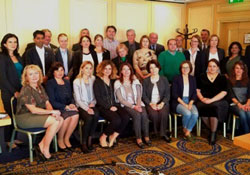WHO/Europe trains its workforce to prepare for and respond to emergencies

WHO
To enhance WHO country support in times of crisis, over 30 WHO staff have improved their skills in readiness for multi-hazard emergencies, such as disease outbreaks, natural disasters, conflicts, and chemical and radiation exposure by undertaking specifically designed training. This training supports the work of the recently established WHO Health Emergencies Programme (WHE) to increase country and staff capacity. WHE’s overarching objective is to effectively and efficiently address the full cycle of health emergencies (prevention, preparedness, readiness, response and recovery).
The workshop, held in Vienna, Austria, on 28–29 September 2017, introduced WHO staff to the basics of contingency planning. It also presented the WHE structure, the International Health Regulations (IHR), the WHO emergency preparedness standard operating procedures, and the revised emergency response framework (ERF II), as well as the role of business continuity planning.
Under different crisis scenarios, trainees learned how to act at country level when an emergency arises, starting with preparing a hazard-specific contingency plan for a WHO country office. They also learned how to assist partners and the Ministry of Health in preparing collaborative plans, aligned to the national health emergency preparedness and response plans and to similar plans of other United Nations agencies in the country. Finally, they learned how to develop a preparedness plan and make it operational through an action plan.
Most of the participants serve in countries in the WHO European Region that are a priority for the WHE – countries that are hazard-prone and striving to further improve their resilience to emergencies. The workshop, organized and facilitated by WHO/Europe, also drew on the experiences of WHO headquarters and external experts. It covered 17 countries in the Region: Albania, Armenia, Azerbaijan, Bosnia and Herzegovina, Bulgaria, Georgia, Kazakhstan, the Republic of Moldova, Romania, the Russian Federation, Serbia, Tajikistan, the former Yugoslav Republic of Macedonia, Turkey, Turkmenistan, Ukraine and Uzbekistan.
Hazard-specific plans are necessary to ensure an adequate response
According to the core capacities of the IHR and to the Sendai Framework for Disaster Risk Reduction, each party to the IHR is required to have in place all-hazard and hazard-specific contingency plans. WHO country offices should therefore be ready to deliver the WHO’s critical functions in response to an emergency effectively and in good time, according to the performance standards set in ERF II.
Scaling up WHO capacity
Both participants and trainers gave a very positive evaluation of the workshop and underlined the need for more such workshops in the Region. Together with WHO headquarters, WHO/Europe will develop and implement a global training package incorporating all elements of the emergency management continuum for WHE staff, which will be tested early next year with the newly hired WHE staff in countries and regional offices.



